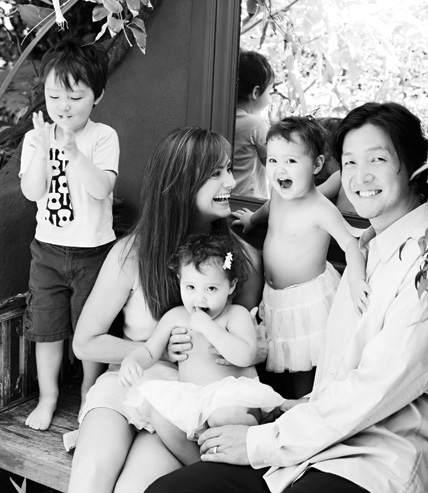 Photos by John Solano Photography
Photos by John Solano Photography
Kiss and Tell
In her new memoir, actress/writer Diane Farr talks openly about her interracial courtship with a Korean American man and the challenges they encountered in their quest to make their own “happily ever after.”
Many may recognize Diane Farr from her TV roles on Numb3rs, Rescue Me and Californication, or even farther back, as the sizzling young sidekick on Loveline alongside Dr. Drew Pinsky and Adam Carolla. Farr was 27 when she co-hosted Loveline, often dispensing cheeky love and sex advice. But more than a decade later, she has emerged as a thoughtful and seasoned voice on, of all things, race relations and interracial love. It’s a topic close to her heart, as Farr, of Irish and Italian heritage, fell in love with Seung Chung, a Korean American who immigrated to the States at age 3, after the two met at an engagement party. They married in 2006 and have three beautiful children.
But before this idyllic multicultural picture could emerge, Farr and Chung confronted a number of challenges as a mixed-race couple, including prejudice from both sides of their families. In her new book, Kissing Outside the Lines: A True Story of Love and Race and Happily Ever After (Seal Press), the actress and writer provides an earnestly candid look at how she and other mixed-race couples navigate these choppy, often intimately painful waters, and contends America is hardly post-racial. But though Farr’s memoir of her own difficulties in “winning” over Chung’s family is honest and often humorous, she’s careful not to demonize anyone—even those who worked as impediments to their interracial union. She explains that it’s often fear and not hate that are the source of parents’ opposition to their child’s interracial match. But she also posits that love is the last prejudice parents openly teach at home, even as they preach the Golden Rule and principles of equity.
And, now Farr has even more of a stake in challenging this incongruity. She told KoreAm recently, “As a mother to Korean American children, I spend a great deal of time trying to find the balance between teaching my kids the important traditions of all their heritages—without making them exclusionary, so that love and race will not ignite like lightning for them, too, someday.”
In the following excerpt from Kissing Outside the Lines, Farr describes the tense confrontation between Chung and his father over her, the white girlfriend, and then the big test: Farr’s inaugural encounter with her future in-laws.
–Julie Ha
***
Dad did not laugh. Seung stopped laughing and respectfully said he didn’t understand the question. “She” is Caucasian, obviously, so what else did he want to know. Seung’s dad asked if I was Polish or of some other European descent. Seung explained that I was Irish and Italian and then raised his shoulders, sort of saying—what is the difference?
I fantasize that Seung raised “a shoulder” at his father—taunting him, almost daring him to say the thing that was really bothering him. That everyone in the family knew was a problem but everyone was now trying not to say. But having read the rules of this family and every family like them who almost lost their language, customs, holidays and beliefs within these parents’ lifetime—I know this was not the case. No matter how much Seung loves me, he would never goad his father because he understands where this fear (dressed as dislike of other races) comes from. Yet, in his own way, raising a shoulder at his father was still out of line because what Seung was actually implying was, “if you have a problem with her race, you should figure out how to say those words because I’m not going to say them for you, in any language.” To which Seung’s father said in English:
“You can’t love one of them.”
Seung shook his head yes, locked eyes with his father and said, “I know.”
After these two words, Seung never let his father’s gaze go. Which was not as much of a challenge as an outsider might imagine—as it was an apology. An apology from a son, who was wholly aware that he was about to fail his father’s greatest wish. But that he was going to do so nonetheless.
***
I’m standing at the door of their D.C. townhouse. Seung’s mother lives here most of the year, as does Seung’s sister. Seung’s father has just flown in from Korea, and so has Seung from Los Angeles. They are all waiting for me on the other side. Several weeks have passed since the father and son face-off and as the door opens, I am peacefully unaware.
I bow when I see them all for the first time. As I stand with my head below my heart, it is Seung’s sister who laughs at me for being “a better Asian” than she is. She reaches out and shakes my hand, pulling me upright and into the house—where she says in a hushed tone that I should not sweat the Korean “mish-i-gosh.”
***
Seung’s dad is so expressive, and clearly funny, that I kind of get an idea of what he’s talking about even before Seung translates for me. He is a charismatic entertainer—which was never what I imagined. I find myself laughing right along with everyone else in this family just from his delivery. Seung’s parents are actually fun—which is an adjective I also never considered I might use for them. Just as I pick up my chopsticks to begin eating, Seung’s mother leans in and whispers something about the meal being made without beef because Seung said I do not eat meat. I think she is justifying why they didn’t utilize the most expensive food for my arrival. I feel very flattered. Ama then whispers to me again:
“And the kimchi very spicy in our house. You pour water on, if too much for you.”
Ama smiles and nods to me many times, like she is doing little bows. I want to jump across the table and hug her. But I’m not actually positive this is what she is saying and I don’t trust myself after failing to let go of sister Eun Yi’s hand earlier. I also think Ama might actually wilt if I touched her at this early stage in our relationship. So instead, I give Seung a prideful yet diminutive smile.
I kind of feel like I’m in a war movie playing the role of the good-girl-American love interest. Seung swallows a laugh when I give him this look. I raise an eyebrow back sort of saying, “What? I’m totally the good-girl love interest!” And I believe I am (although I also laugh out loud when I’m alone in the bathroom as this whole day is a tad surreal). Whoever I am while sitting at this table doesn’t matter as much as the fact that I’m at this table. And no one is yelling or storming out about my being here. Seung shrugs at my role-play and continues talking in Korean with his family. Which, by the way, is hot.
Seung is doing so many sexy things at this table. He is sort of the master of ceremonies: translating, honoring and entertaining everyone. He is handling the pressure fantastically. He is currently telling his father about my trip to Malaysia, which I guess I told him about the night I hit on him at our friends’ engagement party. He is relaying details that I have no recollection of telling him but no one else knows them, so it must have been me. As Seung finishes an impressive tale about me being the first American some devout Muslims on a teeny island had ever met, he winks at me. I think I love him a little bit more today than even yesterday when he asked me to come meet his Ama and Apa for the first time.
After dinner I am invited to sit on a couch next to Seung. We sit across from his mother and father, and sister Eun Yi pulls up a chair making the five of us into a triangle. Seung’s mother and father are not only eager to talk with me, they seem to be very much in love with each other forty years into their marriage. They are holding hands while talking. Seung then takes my hand. Apa asks me a question, via his wife. We talk this way for a while, about movies I think. The scene is so idyllic; I’m not even really paying attention to the conversation. I’m enthralled with how welcome I feel and how happy I am that I didn’t give up before I even got started. I’m making a mental note to myself, that this is Seung’s family and that the ancillary people that come with them shouldn’t weigh me down. Seung’s parents are caring, funny people. It is yet another bonus that comes with him. That and his disco dancing.
Dessert has been served and mostly eaten so now I am ceremoniously getting up to take the finished tea service back to the kitchen. There is no way Ama is letting me in her kitchen no matter how much she likes me, but this “clean up test” is the one that finally puts me over the edge. With big smiles and heavy hands, Ama and Eun Yi push me back on to the couch implying, We’re not kidding—you just sit there next to him. That’s your job in this house. As I settle back into the sofa, even I know . . . I’m in.
—
This excerpt is reprinted with permission from Diane Farr and Seal Press. It has been edited to fit this magazine’s format. To read more of Farr’s work, visit getdianefarr.com.
This article was published in the July 2011 issue of KoreAm.
[ad#bottomad]












